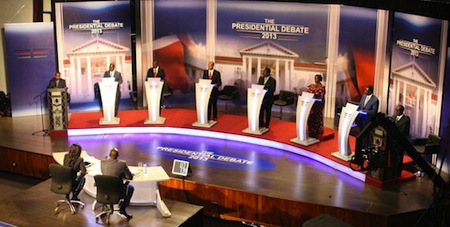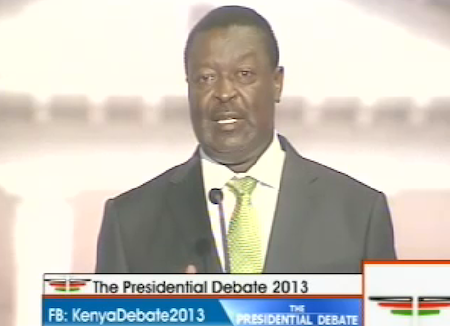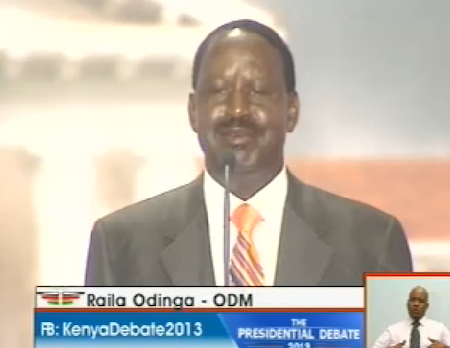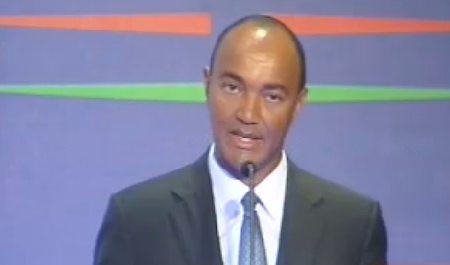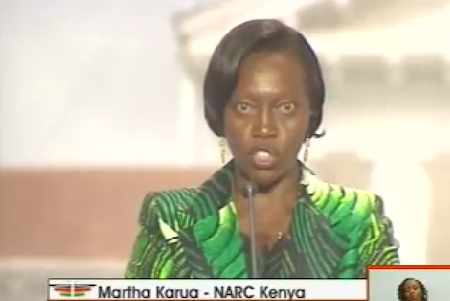While we monitor Italian election results, Kenya is hosting its second and final presidential debate in advance of the March 4 general election. ![]()
The debate, which will feature all eight candidates (despite a last-minute threat by Uhuru Kenyatta not to join the debate), is set to focus on land policy, the economy and foreign policy.
Kenyatta and his chief rival, prime minister Raila Odinga, currently lead polls, with the other six candidates far behind. Read my background on the Kenyan election here.
UPDATE: The debate is now over, and it was a fascinating three hours of debate. The tenacity of the moderators, especially by Uduak Amimo in the first half of the debate, was particularly noteworthy, especially as she went down the row of candidates, challenging each one specifically on allegations of personal corruption and scandal in their own careers. I’ve never quite seen anything like it, certainly not in a U.S. presidential debate.
That Kenya has hosted now, not one, but two, lengthy and robust presidential debates is a tribute to how far Kenyan democracy has come from the days of Daniel arap Moi. Indeed, every sign indicates that all of Kenya’s political leaders have a very keen and active interest in avoiding the kind of ethnic-based political violence that followed the 2007 presidential election. If Kenya manages to make it through the election to a peaceful transfer of power, it will certainly be quite an improvement for not just Kenya, but for east Africa regionally.
It’s also a tribute to the vitality of Kenyan democracy that Kenyans were able to force Kenyatta to join this second debate after he claimed he would not participate late last week. Although Kenyatta took plenty of heat during this debate over how much land he and his family own, there were no mentions, unlike in the first debate, of the International Criminal Court case against Kenyatta.
Ultimately, Kenyatta was viewed as having won the first debate against Odinga, and I think that he won today’s debate as well, so he was well served to show up after all, and I can understand why he’s done such a good job catching up with Odinga in the polls.
He’s a much more forceful debater and even when he’s on defense, his clarity and forceful manner stand quite in contrast to Odinga’s more defensive style. Odinga, for whatever reason, refused on several occasions to go on the offensive against Kenyatta, most notably by excusing his land ownership by arguing Kenyatta is merely an ‘inheritor’ of the ‘original sins’ of land inequality begat at Kenya’s independence.
Speaking of land, the lengthy segment on land reform demonstrated how difficult the issue is and how difficult adjudicating land disputes will be for Kenya’s next president, even as the work of the independent National Land Commission promulgated in 2012, will continue. Although the Commission gave the candidates an easy option to remain vague about land reform, it’s clear that no domestic issue will be more important in the next five years.
The race remains largely an Odinga-Kenyetta showdown, and polls show the race essentially tied between the two, with a runoff increasingly likely.
Among the other candidates, however, notably Mohammed Abduba Dida, Martha Karua, Peter Kenneth and James Ole Kiyiapi, it’s clear there’s a second tier of presidential aspirants who are well-informed and thoughtful on the issues of the day, who are willing to challenge both Odinga and Kenyatta, and who may well serve ably in the future in the governments of either an Odinga or Kenyatta presidency.
11:43 a.m.: First segment to focus on the economy.
11:48 a.m.: Odinga gets his first question — what’s the least wage a Kenyan should earn?
11:49 a.m.: Odinga is talking about a ‘dialogue,’ and the moderator sharply asks him whether he even knows what the standard of living is in Kenya. Odinga’s talking about the rise of price of milk — from 25 shillings to 45 shillings. The two moderators, KTN’s Joe Ageyo and Citizen TV’s Uduak Amimo, are proving that they are not wallflowers. What’s most notable about the debate today is perhaps that it’s happening — not only one, but two, presidential debates, and a leading contender (Kenyatta) was shamed into appearing after trying to avoid joining today’s debate.
11:53 a.m.: Kenyatta (shown below) gets the minimum wage question and talks about making Kenya competitive — maintaining the prices of food and services rather than by lifting the wage. That is consistent with his more right-wing views on economic policy (and with his the views of his father, Jomo Kenyatta, Kenya’s first president, half a century ago).
11:59 a.m.: Deputy prime minister Musalia Mudavadi (shown below) gets his first question. He emphasizes that Kenyans spend 70% of their income on food — not on spending. Mudavadi argues that Kenya needs agricultural reform to make food cheaper, thereby giving Kenyans more money for other needs. He also talks about energy reform — making fuel cheaper. Amimo pushes him on specifics, though. None of the major candidates is making a clear statement on the lowest minimum wage that is acceptable to Kenyans.
12:04 p.m.: Kenyatta argues for a freeze in the top 10% of Kenyan earners. Odinga, however, says not only a freeze, but a reduction, and pledges to reduce his own salary if elected.
12:08 p.m.: Amimo is certainly taking off the gloves now — she’s going after allegations of corruption, personally, that each candidate has faced in the past. It’s more aggressive than the questioning in U.S. presidential debates. First up is minor candidate Paul Muite, who’s been asked about charges of accepting a bribe. So far, Amimo is the winner of this debate — and so is Kenya. In a developing democracy, every candidate is forced to answer publicly for their own personal records. It’s incredibly impressive.
12:13 p.m.: Now it’s Mudavadi’s turn.
12:16 p.m.: Odinga (pictured below) is getting roughed up now. He’s defending himself from corruption charges related to a subsidy scandal by arguing that it nonetheless created jobs and that his office was just coordinating the edit.
12:19 p.m.: ‘Your time is up.’ Seriously, Amimo is more aggressive about time limits and follow-ups than any moderator of any U.S. presidential debate I’ve ever seen.
12:24 p.m.: Amimo is now asking Kenyatta about a ‘clerical’ error that resulted in millions of shillings being lost in budget Kenyatta presented to the parliament. Kenyatta rebuts that no money was lost, but rather a clerical error, rather forcefully, and claims to have instituted a new scheme to ensure such errors don’t happen in the future. It’s the best and most direct response in this round so far.
12:30 p.m.: Academic and former education minister James Ole Kiyiapi has taken on both Odinga and Kenyatta on an education funding scandal — both Odinga and Kenyatta sound defensive on the issue, but Kenyatta’s style throughout the debate and, especially, on the corruption issue, has been much steadier. It’s hard to believe Odinga when he mumbles about taking action when scandals arise.
12:33 p.m.: Former justice minister Martha Karua is now volunteering further scandals involving Mudavadi and Odinga. Aggressive!
12:40 p.m.: Longshot candidate Mohammed Abduba Dida, who has provided some comic relief to the first debate, gets audience laugher by thanking the moderator for her questions on personal integrity, then posits, ‘Do you expect a thief to tell you I’ve stolen?’
12:46 p.m.: Odinga is very defensive about the 2007-08 power sharing deal — and he was the 2007 presidential loser! He’s blaming judiciary for being partisan.
12:48 p.m.: Eagle alliance candidate Peter Kenneth (pictured below) takes a strong stand against the political elite for the 2007-08 violence: Did it have to take 60 days? With so many lives lost? Property damaged? Couldn’t we have tried different methods? I hope next Monday we will not have a repeat. It’s unacceptable. A very strong moment for Kenneth.
12:54 p.m.: Has Mwai Kibaki’s name been mentioned once?
12:55 p.m.: Kenyatta triumphs the new constitution as a path forward for Kenya in avoiding future flare-ups of political violence following elections and resulting economic tumult. He takes ethnic issues head-on for the first time in the debate: “Using ethnic animosity in elections — I think the constitution is very clear to ensure the issue of hate speech and such don’t apply.” Hopes that next week, the world will be able to say that Kenya has come of age and Kenyans can handle the results in a non-violent manner.
12:57 p.m.: Question to Odinga over whether he shares blame for Kenya’s poor economy. Odinga starts off by talking about getting Kenya from a banana republic to what it should be, boilerplate rhetoric. Amimo goes after him harshly with a follow-up: “So you accept no responsibility for past instability?”
1:00 p.m.: Former justice minister Karua (pictured below): I have seen leaders on this podium assailing our institutions.
1:03 p.m.: Kiyiapi says Kenya needs to give power back to the people, what drives elections in Kenya is raw power, and that Kenya needs leaders who are not power-hungry. A powerful statement.
1:04 p.m.: Abduba Dida is still making jokes.
1:08 p.m.: The first part of the presidential debate is over.
1:19 p.m.: Still in a break for commercials — don’t worry!
1:25 p.m.: Now we turn to land reform. Kenneth takes a question about whether he’s referred to opponents as ‘land grabbers.’
1:29 p.m.: Kenyatta accused of owning half of Kenya by Karua; Kenyatta challenges Karua to take him to this land and he can begin ‘to do something about it.’ Says it’s a very difficult question, and the manner in which it’s been handled hasn’t been professional. Calls for an independent land commission to be given mandate for a solution.
1:30 p.m.: Ageyo asks, “So how much land do you own?” Kenyatta argues that he and his family haven’t obtained land illegally, and that he’s used it productively.
1:32 p.m.: Odinga says there’s ‘enough land for each one’s need, but not enough for each one’s greed.’ That seems to fall a little flat. He’s not willing to attack Kenyatta directly on stage the way Karua has, he’s only saying obliquely that you can’t allow a hyena to guard your goats. So that’s passively referring to Kenyatta.
What’s clear is that Odinga’s odd role in power-sharing for the past five years has forced him to defend Kenya’s government for the past five years without any of the advantages of incumbency.
1:40 p.m.: The National Land Commission was established under Kenya’s new constitution and the National Land Commission Act of 2012. It’s set to recommend a national land policy for Kenya, a program to settle title registration and make further recommendations for the most efficient use of land resources. Kenya’s president, Kibaki, only four days ago announced the names of the nine commissioners following a court battle over the nominations.
1:43 p.m.: Kenyatta is still defending his family’s ownership of so much land — all purchases have involved a willing buyer and a willing seller. Shifts focus on settling the issue of land that’s unadjudicated so that the land can be utilized to increase production in Kenya.
1:45 p.m.: “How much, sir?” Kenyatta is still refusing to reveal how much land he owns in Kenya.
1:46 p.m.: Kenyatta says he will take an oath to defend the constitution — it’s the responsibility to ensure that the constitution’s fulfilled in the best interests of the Republic of Kenya. Even on the defense, he’s forceful. I understand why so many people believe Kenyatta was the winner of the first debate, and I think he’s winning this debate as well.
1:48 p.m.: Odinga oddly says Kenyatta was ‘just an innocent inheritor’ from the original sin of land-grabbing.
1:49 p.m.: Karua again makes a strong case against Kenyatta, stronger than Odinga. Kenyatta again argues he’s not the largest landowner in Kenya. Admits that his family owns 30,000 acres in Taita Taveta, and he’s helped settle squatters in that area. But Kenyatta keeps bringing the issue back to policy and adjudicating titles to land with unclear ownership.
1:52 p.m.: Mudavadi piously states his own land holdings, and argues that no one can hide ownership in Kenya (though it seems clear that Kenyatta’s doing a pretty good job). He says that one could have 10 acres and make efficient use of it, another could have 100 acres and not. The key is the economic use that the land will be put to, and the Land Commission and counties should focus on that.
1:58 p.m.: Audience member Fatuma provides first audience-directed question about taking land without compensation from Nubian minority in Nairobi. Kiyiapi takes question first and starts blasting local elites taking advantage of resources.
2:05 p.m.: Basically, everyone seems to place all the hard questions and solutions of land reform on the Land Commission. Mudavadi unhelpfully notes that the commission has its work cut out for it.
2:10 p.m.: From both Odinga and Kenyatta, I hear a lot of rhetoric and discussion about involving local government and communities. But I’m not sure that’s an incredibly specific answer for a question that’s been at the heart of Kenyan national politics for the past half-century since independence and was one of the key issues that caused the rift between Odinga’s father and Kenyatta’s father in 1964-66.
2:15 p.m.: The key issue here is the claim of Nubians to Kibera, which is the largest slum in Nairobi. Among the difficult land issues, Kibera stands as one of the most unimaginably tangled. Both Kenyatta and Odinga have agreed that there should be some granting of title to the land, through communal titles.
2:19 p.m.: No subtitles for the debate, so far as I can tell, so the Swahili language section has me a bit lost.
2:23 p.m.: We’re still in Swahili-language answers, unfortunately for non-Swahili-speakers like me — in the meanwhile, you can follow updates at the official debate Twitter feed.
2:30 p.m.: From secondhand sources, the lines of the past 15 minutes of the Swahili-language portion of the debate seem to have gone as follows: Kenneth claims he could rid Kenya of squatters in his first 100 days in office, Mudavadi (credibly) claims that land reform is much more complicated, Kenyatta has disclaimed any blame for the failure to enact more land reform while finance minister because the land ministry held up efforts, and Odinga is left playing defense as the incumbent prime minister.
2:32 p.m.: Now to closing statements. Back to English, mercifully for me.
2:33 p.m.: Kenneth says the debate has not been about him, but about Kenyans and the problems facing them: rising unemployment, food insecurity, actual insecurity. Kenneth argues he’s the best choice to represent a new approach.
2:33 p.m.: Kenyatta says that 50 years on, Kenya requires a new beginning, not built on the past, not built on hatred or disunity, but focusing on the real challenges that face Kenya. The growing economy hasn’t been felt by the average citizen in Kenya — focus on the solutions, not ‘moaning on problems,’ transforming Kenya to be ‘a lion in Africa.’ Ensure devolution is enacted and increase resources for devolution.
2:35 p.m.: Abduba Dida ends by imploring that ‘our problems should lead us together.’ A strong finish for a candidate who’s typically a punchline generator.
2:37 p.m.: Odinga says Kenya’s at a crossroads, and that his coalition stands for change and reforms. Claims Kenya has moved the economy from the ICU to the general ward, and Odinga now wants to bring it from the general ward forward, creating ‘jobs, jobs, jobs,’ and create wealth to move Kenya from a ‘backward, third-world economy’ to a top economy.
2:38 p.m.: Karua says that she looks at her grandchild and see unlimited hope. When we have leaders who steal resources, Kenya can’t move forward. She points to her record of standing up against corruption, standing with rule of law, and says, powerfully and simply, ‘you can trust me.’
2:41 p.m.: Mudavadi notes there are some polarizing positions in Kenya, says that he’s not a polarizing leader. Wants to move Kenya as one team, as one nation, to ensure that the social security of Kenya’s people is accomplished.
